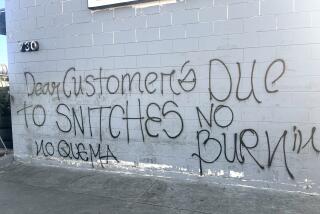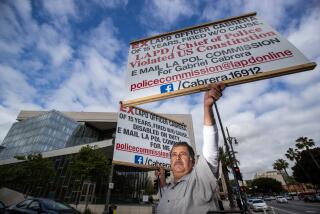Mechanic Became a Lawyer to Fight Officers’ Raids
- Share via
It sounded as clean and sweet to Phillip Long’s ears as the fine-tuned thrum of a four-stroke Harley.
In stately phrases that paid off for all those late nights and lost weekends, when the 10th-grade-dropout motorcycle mechanic labored over law books as big as a dirt bike’s engine casing, a U.S. District judge ruled this week that Phillip Long was right and California state law was wrong: Henceforth, police can’t just show up whenever they please at the garage door of a car or motorcycle repair shop to rummage for hot wheels or stolen parts, making life miserable for hard-working grease monkeys like Phillip Long. They have to have a warrant.
The ruling makes Long mighty happy. He was tired of cops dropping by his Lynwood motorcycle repair shop unannounced, making him drop his socket wrenches and handcuffing him, locking the doors and poking through his desk, thinking he might be handling stolen choppers.
It had made Long mad enough to learn how to type, mad enough to buy a computer and a copier and those big $150 door-stopper law books, mad enough to stand up before federal judges as his own lawyer.
“I don’t want to say I’m some sort of legal genius, because I ain’t by any means,” says Long, 37.
“You have a lot of people there (in courts) with very arrogant attitudes . . . they went to law school.” And in their eyes, “Who are you? You’re just some grease ball who works in a motorcycle shop. But anybody can go to the lawbooks, and see what the law says.”
And so he did.
This man whose dress-up clothes are a rainbow-weave tweed jacket and sturdy black shoes, whose only diploma is from an 18-month motorcycle repair course at Los Angeles Trade Tech, whose fingernails bear the indelible grime of his trade, went mano a mano against polished lawyers with polished fingernails and won.
Judge Stephen V. Wilson wrote that Vehicle Code Section 2805, which allows warrantless searches of junkyards and auto and motorcycle repair shops, is unconstitutional. The state code “appears at a single stroke to offend every clause of the Fourth Amendment,” the judge said.
The attorney general’s office has “not yet determined whether we will appeal,” said Deputy Atty. Gen. Robert Breton.
The judge’s ruling was a happy interval in a long, sometimes bitter relationship with the law.
Long filed his first civil rights suit after an incident in 1987, when, he said, sheriff’s deputies kicked in his door and fired a shot in his house after someone “reported I was beating my kids”--which was untrue, said the father of five.
He filed a second federal suit after sheriff’s deputies again came into his shop without a warrant. He refused to give them his name or to be fingerprinted. He was arrested for interfering with a police officer, battery on a police officer and receiving stolen property--a dirt bike bought by an employee and never reported stolen, said Long. Those charges were dropped, he said.
The judge’s ruling this week resolved the part of the suit brought against the state. Long said he settled another part of it against the county for $35,000.
The third federal lawsuit was filed after a 1989 incident in which the CHP came by, saying Long had altered numbers on some engine casings. That suit and five misdemeanor charges against him are still pending.
More to Read
Sign up for Essential California
The most important California stories and recommendations in your inbox every morning.
You may occasionally receive promotional content from the Los Angeles Times.











